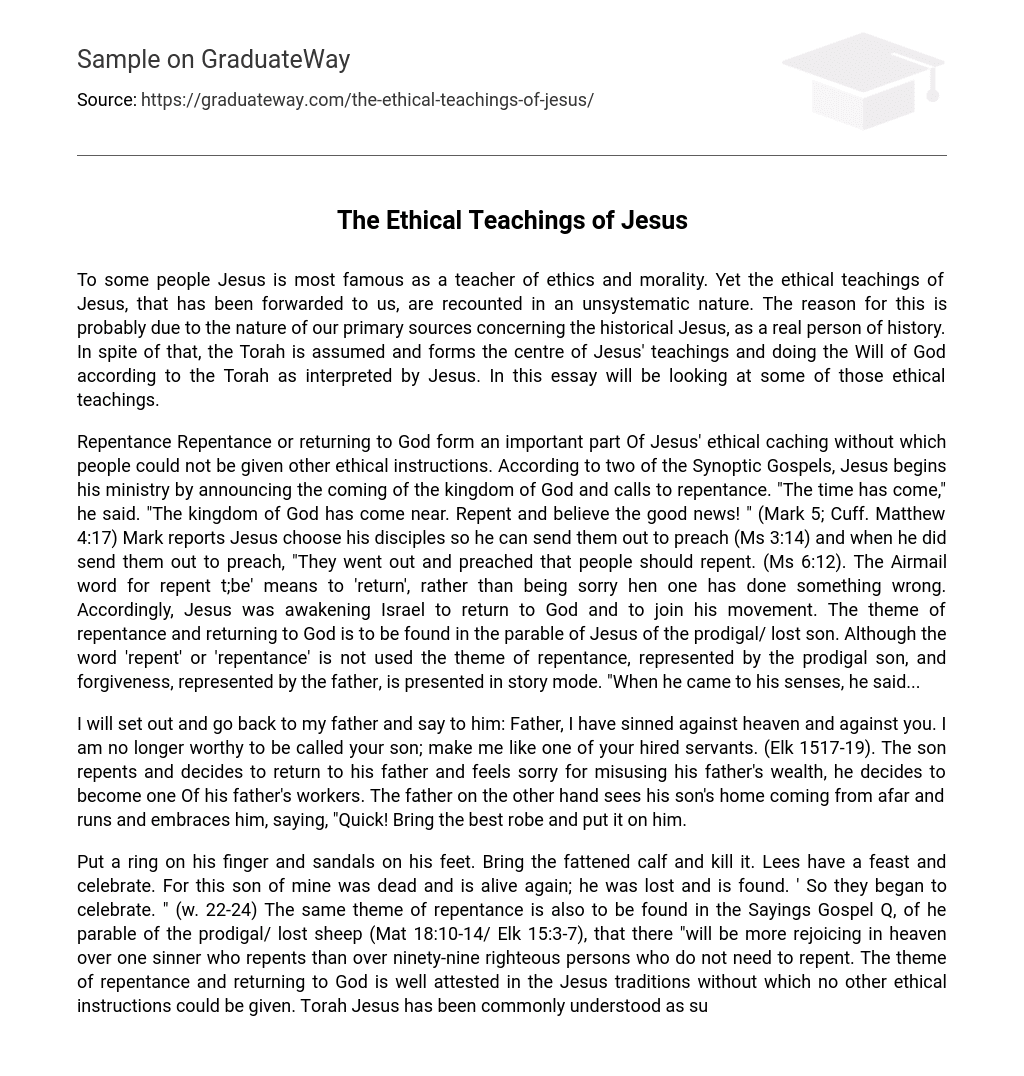To some people Jesus is most famous as a teacher of ethics and morality. Yet the ethical teachings of Jesus, that has been forwarded to us, are recounted in an unsystematic nature. The reason for this is probably due to the nature of our primary sources concerning the historical Jesus, as a real person of history. In spite of that, the Torah is assumed and forms the centre of Jesus’ teachings and doing the Will of God according to the Torah as interpreted by Jesus. In this essay will be looking at some of those ethical teachings.
Repentance Repentance or returning to God form an important part Of Jesus’ ethical caching without which people could not be given other ethical instructions. According to two of the Synoptic Gospels, Jesus begins his ministry by announcing the coming of the kingdom of God and calls to repentance. “The time has come,” he said. “The kingdom of God has come near. Repent and believe the good news! ” (Mark 5; Cuff. Matthew 4:17) Mark reports Jesus choose his disciples so he can send them out to preach (Ms 3:14) and when he did send them out to preach, “They went out and preached that people should repent. (Ms 6:12). The Airmail word for repent t;be’ means to ‘return’, rather than being sorry hen one has done something wrong. Accordingly, Jesus was awakening Israel to return to God and to join his movement. The theme of repentance and returning to God is to be found in the parable of Jesus of the prodigal/ lost son. Although the word ‘repent’ or ‘repentance’ is not used the theme of repentance, represented by the prodigal son, and forgiveness, represented by the father, is presented in story mode. “When he came to his senses, he said…
I will set out and go back to my father and say to him: Father, I have sinned against heaven and against you. I am no longer worthy to be called your son; make me like one of your hired servants. (Elk 1517-19). The son repents and decides to return to his father and feels sorry for misusing his father’s wealth, he decides to become one Of his father’s workers. The father on the other hand sees his son’s home coming from afar and runs and embraces him, saying, “Quick! Bring the best robe and put it on him.
Put a ring on his finger and sandals on his feet. Bring the fattened calf and kill it. Lees have a feast and celebrate. For this son of mine was dead and is alive again; he was lost and is found. ‘ So they began to celebrate. ” (w. 22-24) The same theme of repentance is also to be found in the Sayings Gospel Q, of he parable of the prodigal/ lost sheep (Mat 18:10-14/ Elk 15:3-7), that there “will be more rejoicing in heaven over one sinner who repents than over ninety-nine righteous persons who do not need to repent. The theme of repentance and returning to God is well attested in the Jesus traditions without which no other ethical instructions could be given. Torah Jesus has been commonly understood as summarizing the whole Of the Torah in two commandments, which was to love God and to love one’s neighbor. According to Jesus these two commandments were more important than the animal sacrifices that the Jews made at the alter.
A Jewish scribe of the law was impressed by the answers that Jesus has been giving when debating other people, he asked him, of all the commandments that God had given the Jews in the Torah, which one was the most important one of these 613 precepts? Jesus’ answered him and his answer went straight to the heart of the “The most important one,” answered Jesus, “is this: ‘Hear, O Israel: The Lord our God, the Lord is one. Love the Lord your God with all your heart and with all your soul and with all your mind and with all your strength. ‘ The second is this: ‘Love your neighbor as yourself.





